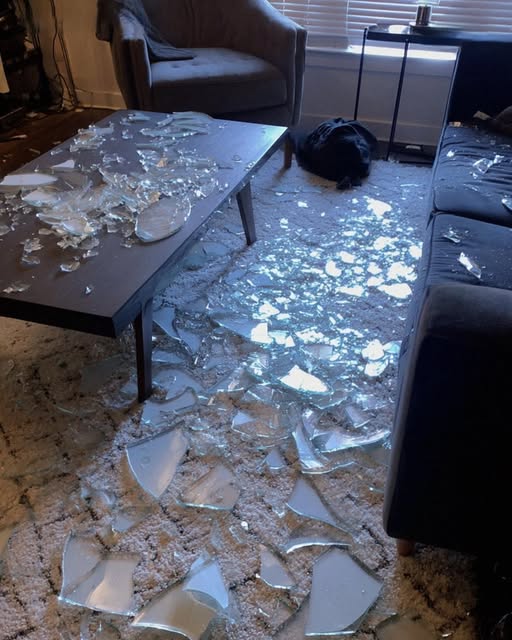When my stepmother smashed my late mother’s treasured crystal set just weeks before my wedding, I thought my heart would never recover. She stood there with that smug little smile, convinced she had erased Mom’s presence from my life forever. What she didn’t know was that she had just walked into her own downfall.
My name is Jennifer. I’m twenty-five, and I lost my mom, Alice, when I was sixteen. That loss still aches like it happened yesterday. She was everything to me—gentle, graceful, the kind of woman who could make a room feel warm just by walking into it. She always smelled of lavender and fresh cinnamon rolls. More than a mother, she was my best friend.
When she died, she didn’t leave me much. But she left me one thing that mattered more than anything: her crystal glass set. To most, they were just delicate pieces of glass. To me, they were living reminders of her. Every Sunday she would carefully take them out, polish them until they shone like diamonds, and tell me stories about how she bought them on a whim in downtown Grove Wood.
“Jenny,” she’d tell me, “these are for moments that matter. When you use them, make sure it’s for something truly special.”
That special moment finally arrived when Michael proposed to me. The thought of using Mom’s crystals at my wedding filled me with both joy and comfort. But my stepmother, Sandra, had other plans.
Sandra married my dad five years after Mom passed away. From the start, she made it clear that my mother’s memory bothered her. Every time I mentioned Mom’s name, Sandra’s face would twist as if she’d tasted something bitter. I tried to ignore her, but after my engagement, her bitterness grew more aggressive.
First came the cruel comments. “Are you going to walk down the aisle alone, or drag your mother’s urn with you?” Then came the demands. One morning, she announced flatly that I would wear her wedding dress instead of my own. I laughed, thinking it was a joke, but she wasn’t joking. She believed that as my father’s wife, I should honor her in front of everyone. I told her no, of course. She didn’t take it well.
Two weeks later, I came home to find the unthinkable. The dining room floor was covered in glittering shards. Mom’s crystal set had been smashed to pieces. And there was Sandra, broom in hand, looking satisfied.
“Oh, Jen!” she said in mock surprise. “I was reaching for something and the whole cabinet just toppled over. Such a shame.”
I could barely breathe. She wasn’t even trying to hide her glee. I ran upstairs, refusing to give her the pleasure of seeing me cry. That night I called Aunt Marlene, Mom’s sister, sobbing into the phone.
“She destroyed Mom’s crystals,” I choked out.
There was silence on the other end. Then Aunt Marlene spoke quietly. “Jennifer, I need to tell you something. Last week when I visited, Sandra was on the phone with her friend. She said she was planning to smash those crystals on purpose. She wanted to erase Alice from your wedding.”
My stomach turned. It hadn’t been an accident—it was deliberate.
But then Marlene’s voice softened. “I suspected as much, so I switched the sets. What Sandra broke was a cheap replica I found at the thrift store. The real crystals are safe in my attic. And I set up a small camera in your dining room. We caught everything on video.”
For the first time in weeks, I smiled.
I played along with Sandra, pretending to be broken and defeated. She preened, convinced she had finally destroyed my mother’s memory. But three days later, at my wedding reception, the truth came out.
The hall was glowing with white flowers and music when I took the microphone. I thanked the guests, then said, “There’s someone very important I need to honor—my mother, Alice.”
The projector screen lit up with a photo of Mom and me polishing the crystals when I was a child. The crowd sighed softly. Then the video rolled.
Sandra’s voice echoed through the speakers: “If Jennifer wants to honor someone, it should be me. Time to get rid of Alice’s precious memories.”
Gasps rippled across the room as Sandra appeared on screen, deliberately smashing each glass. Her laughter filled the hall: “Let’s see her honor her precious mommy now!”
When the lights came back up, all eyes turned on Sandra. She sat frozen, pale as chalk, her smugness gone. I lifted my chin and spoke. “Fortunately, what you just saw was only a replica. The real crystal set is safe, thanks to my Aunt Marlene.”
Right then, Marlene walked in carrying Mom’s original glasses on a silver tray. They sparkled under the lights, scattering rainbows across the ceiling. The room erupted in applause.
My father stood, his face dark with fury I had never seen before. He walked to Sandra’s table, his voice hard. “Pack your things. We’re done.”
Sandra tried to stammer excuses, but no one was listening. She grabbed her purse and fled the hall in disgrace.
That night, we toasted with Mom’s real crystal glasses. As I raised mine, I felt her with me—her warmth, her love, her pride. Sandra thought she had destroyed my mother’s legacy. Instead, she had exposed her own cruelty for everyone to see.
Sometimes justice doesn’t need a courtroom. Sometimes it just needs a little planning, a hidden camera, and the truth brought into the light. And like sunlight through crystal, the truth is impossible to break.
